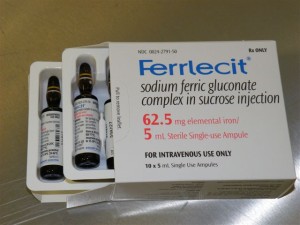
European Union (EU) drug regulators today recommended precautions for treating iron deficiency anemia with intravenous (IV) iron supplements to reduce the risk for potentially fatal allergic reactions.
Some of the recommendations mirror label instructions for IV iron products approved by the US Food and Drug Administration (FDA), whereas other recommendations do not.
Clinicians turn to IV iron supplements to treat iron deficiency anemia when patients cannot absorb oral iron supplements or experience worse anemia despite adequate oral doses. Examples of these IV treatments are iron dextran injection (Dexferrum, American Regent; Infed, Watson Pharmaceuticals), iron sucrose injection (Venofer, American Regent), and sodium ferric gluconate complex in sucrose injection (Ferrlecit, sanofi-aventis).
All IV iron supplements come with the risk for an anaphylactic reaction. The rate of adverse events, including anaphylactic reactions, associated with these products increased in Europe and North America from 2003 to 2009, with iron dextran injection posting the highest increase, according to apresentation at the European Renal Association–European Dialysis and Transplant Association Congress in 2010.
However, the risk is outweighed by the benefits of this therapy, provided clinicians take certain precautions, according to the Committee for Medicinal Products for Human Use (CHMP), part of the European Medicines Agency (EMA).
One CHMP recommendation is that clinicians administer IV iron supplements only in facilities equipped for resuscitation if the patient experiences an allergic reaction. This precaution already appears on the FDA-approved labels of iron dextran injection, iron sucrose injection, and sodium ferric gluconate complex in sucrose injection.
CHMP also advises clinicians not to administer IV iron supplements to pregnant women "unless clearly necessary," and then only in the second or third trimester. The labels for IV iron supplements in the United States also urge a cautious approach for pregnant women but do not limit the drugs to the second or third trimester.
Clinicians customarily have administered a small dose of IV iron supplements to test for any allergic reaction. CHMP recommends that clinicians do away with test doses because they are not "a reliable way to predict how the patient will respond when the full dose is given." Instead, any and every dose warrants caution, "even if previous administrations have been well tolerated." In contrast, a black box warning on the FDA-approved label for iron dextran injection calls for a test dose.
The recommendations of CHMP now go to the European Commission, the executive branch of the EU, for a final decision.
More information about the CHMP recommendations regarding IV iron supplements is available on the EMA Web site.





 留言列表
留言列表
 線上藥物查詢
線上藥物查詢 